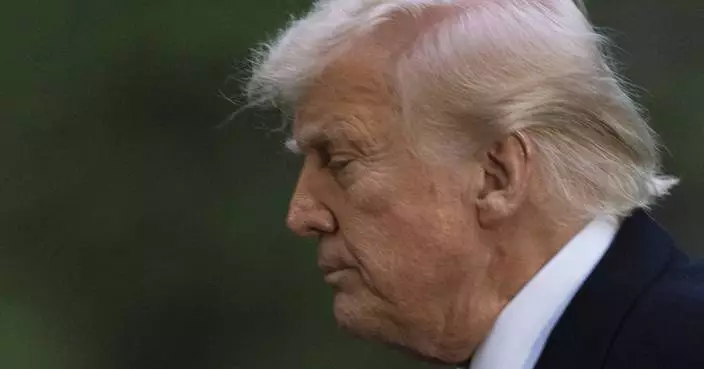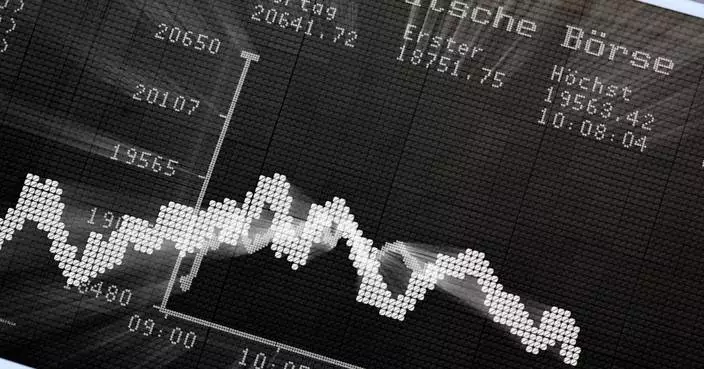The average rate on a 30-year mortgage in the U.S. edged lower for the second week in a row, a modest but welcome boost for prospective home shoppers in the midst of the spring homebuying season.
The rate fell to 6.64% from 6.65% last week, mortgage buyer Freddie Mac said Thursday. A year ago, the rate averaged 6.82%.
The average rate has mostly trended lower since reaching just over 7% in mid-January. When mortgage rates decline, they boost homebuyers’ purchasing power.
Borrowing costs on 15-year fixed-rate mortgages, popular with homeowners refinancing their home loans, also fell this week, pulling the average rate down to 5.82% from 5.89% last week. A year ago, it averaged 6.06%, Freddie Mac said.
Mortgage rates are influenced by factors including bond market investors’ expectations for future inflation, global demand for U.S. Treasurys and the Federal Reserve’s interest rate policy decisions.
The overall decline this year in the average rate on a 30-year mortgage loosely follows moves in the 10-year Treasury yield, which lenders use as a guide to pricing home loans.
The yield, which was nearing 4.8% in mid-January, has mostly fallen since then, amid signs that the economy is slowing and worries that tariffs imposed by the Trump administration on goods imported from around the globe could hurt economic growth and fuel inflation.
The yield slid to 4.06% Thursday as a sharp sell-off on Wall Street following the White House’s latest and most severe volley of tariffs fueled expectations among bond investors that the Fed may have to cut its main interest rate if the economy sours.
“The 10-year Treasury has dipped even further this morning as investors are exiting the stock market, so it’s likely that mortgage rates will continue to come down in the coming months as a result,” said Joel Berner, senior economist at Realtor.com. “This shock to the system will be felt in the housing market for the rest of the year.”
Recent forecasts by housing economists generally called for the average rate on a 30-year mortgage to remain around 6.5% this year.
Lower mortgage rates can help spur home sales by make homeownership more affordable. At the same time, many Americans may put off buying a home if they're worried about losing their job or taking a hit on their stock portfolio during an economic downturn.
“It remains to be seen whether relief from mortgage rates will spur buyers to make a move in 2025, or if the broader economic conditions will slow things down,” Berner said.
The U.S. housing market has been in a sales slump since 2022, when mortgage rates began to climb from pandemic-era lows. Sales of previously occupied U.S. homes fell last year to their lowest level in nearly 30 years.
Easing mortgage rates and more homes on the market nationally helped drive sales higher in February from the previous month, though they were down year-over-year.
Even with mortgage rates easing this year, rising home prices are helping to drive up the cost of homeownership. The typical monthly payment made by U.S. homebuyers climbed to a record-high $2,802 in the four weeks that ended March 20, according to Redfin.

FILE - A for sale sign stands outside a home on the market in the Alamo Placita neighborhood Tuesday, Aug. 27, 2024, in central Denver. (AP Photo/David Zalubowski, File)
President Donald Trump remained defiant Monday as global markets continued plunging after his tariff announcement last week.
Trump has insisted his tariffs are necessary to rebalance global trade and rebuild domestic manufacturing. He's singled out China as “the biggest abuser of them all” and criticized Beijing for increasing its own tariffs in retaliation.
Here's the latest:
Wilmer Escaray left Venezuela in 2007 and enrolled at Miami Dade College, opening his first restaurant six years later.
Today, he has a dozen businesses that hire Venezuelan migrants like he once was, workers who are now terrified by what could be the end of their legal shield from deportation.
Since the start of February, the Trump administration has ended two federal programs that together allowed more 700,000 Venezuelans to live and work legally in the U.S. along with hundreds of thousands of Cubans, Haitians and Nicaraguans.
In the largest Venezuelan community in the United States, people dread what could face them if lawsuits that aim to stop the government fail. It’s all anyone discusses in “Little Venezuela” or “Doralzuela,” a city of 80,000 people surrounded by Miami sprawl, freeways and the Florida Everglades.
▶ Read more about fears in Miami’s ‘Little Venezuela’
The Monday meeting will make Netanyahu the first foreign leader to visit Trump since he unleashed tariffs on countries around the world.
Whether Netanyahu’s visit succeeds in bringing down or eliminating Israel’s tariffs remains to be seen, but how it plays out could set the stage for how other world leaders try to address the new tariffs.
Netanyahu’s office has put the focus of his hastily organized Washington visit on the tariffs, while stressing that the two leaders will discuss major geopolitical issues including the war in Gaza, tensions with Iran, Israel-Turkey ties and the International Criminal Court, which issued an arrest warrant against the Israeli leader last year. Trump in February signed an executive order imposing sanctions on the ICC over its investigations of Israel.
▶ Read more about Trump’s meeting with Netanyahu
The stock market briefly spiked on a report that Kevin Hassett, a top White House economic adviser, said the president was considering a 90-day pause on tariffs.
The supposed remark from Hassett circulated on social media, but no one could pinpoint where it came from even as the market flashed from red to green.
Hassett had spoken to Fox News earlier in the morning, when he was asked about a potential pause. However, he was noncommittal.
“I think the president is going to decide what the president is going to decide,” he said.
▶ Read more updates on the financial markets
Vance’s mother, Beverly Aikins’ on Friday received a 10-year sobriety medallion in the Roosevelt Room at a ceremony with friends and family.
Vance described Aikins’ past drug addiction in his bestselling book “Hillbilly Elegy.”
The cases are likely headed to a Supreme Court showdown on the president’s power over independent agencies.
A divided U.S. Court of Appeals for the District of Columbia Circuit issued the ruling in the lawsuits separately brought by Merit Systems Protection Board member Cathy Harris and National Labor Relations Board member Gwynne Wilcox.
The ruling reverses, at least for now, a judgement from a three-judge panel from the same appellate court.
▶ Read more about Trump and the board members
The dispute over tariffs has caused some fracturing within Trump’s political coalition.
Hedge fund manager Bill Ackman said the president was “launching a global economic war against the whole world at once” and urged him to “call a time out.”
“We are heading for a self-induced, economic nuclear winter,” he wrote on X on Sunday.
Top White House economic adviser Kevin Hassett told Fox News on Monday morning that Ackman should “ease off the rhetoric a little bit.”
Hassett said critics were exaggerating the impact of trade disputes and talk of an “economic nuclear winter” was “completely irresponsible rhetoric.”
The president showed no interest in changing course despite turmoil in global markets.
He said other countries had been “taking advantage of the Good OL’ USA” on international trade.
“Our past ‘leaders’ are to blame for allowing this, and so much else, to happen to our Country,” he wrote on Truth Social. “MAKE AMERICA GREAT AGAIN!”
Trump criticized China for increasing its own tariffs and “not acknowledging my warning for abusing countries not to retaliate.”
On a day when stock markets around the world dropped precipitously, Alabama Republican Party Chairman John Wahl led a celebration of the president whose global tariffs sparked the sell-off.
With no mention of the Wall Street roller coaster and global economic uncertainty, Wahl declared his state GOP’s “Trump Victory Dinner” — and the broader national moment — a triumph. And for anyone who rejects Trump, his agenda and the “America First” army that backs it all, Wahl had an offer: “The Alabama Republican Party will buy them a plane ticket to any country in the world they want to go to.”
Wahl’s audience — an assembly of lobbyists and donors, state lawmakers, local party officials and grassroots activists — laughed, applauded and sometimes roared throughout last week’s gala in downtown Birmingham.
Yet beyond the cheerleading, there were signs of a more cautious optimism and some worried whispers over Trump’s sweeping tariffs, the particulars of his deportation policy and the aggressive slashing by his Department of Government Efficiency.
▶ Read more about Trump’s support in Alabama
This morning, at 11 a.m., World Series Champions, the Los Angeles Dodgers, will visit the White House and meet the president. Later, at 1 p.m., Israel Prime Minister Benjamin Netanyahu will visit the White House and meet with Trump. At 2 p.m., Netanyahu and Trump will participate in a Bilateral Meeting in the Oval Office. At 2:30 p.m., they will hold a joint news conference.
Trump said Sunday that he won’t back down on his sweeping tariffs on imports from most of the world unless countries even out their trade with the U.S.
Speaking to reporters aboard Air Force One, Trump said he didn’t want global markets to fall, but also that he wasn’t concerned about the massive sell-off either, adding, “sometimes you have to take medicine to fix something.”
His comments came as global financial markets appeared on track to continue sharp declines once trading resumes Monday, and after Trump’s aides sought to soothe market concerns by saying more than 50 nations had reached out about launching negotiations to lift the tariffs.
The higher rates are set to be collected beginning Wednesday. Treasury Secretary Scott Bessent said unfair trade practices are not “the kind of thing you can negotiate away in days or weeks.” The United States, he said, must see “what the countries offer and whether it’s believable.”
▶ Read more about the global impact of Trump’s tariffs
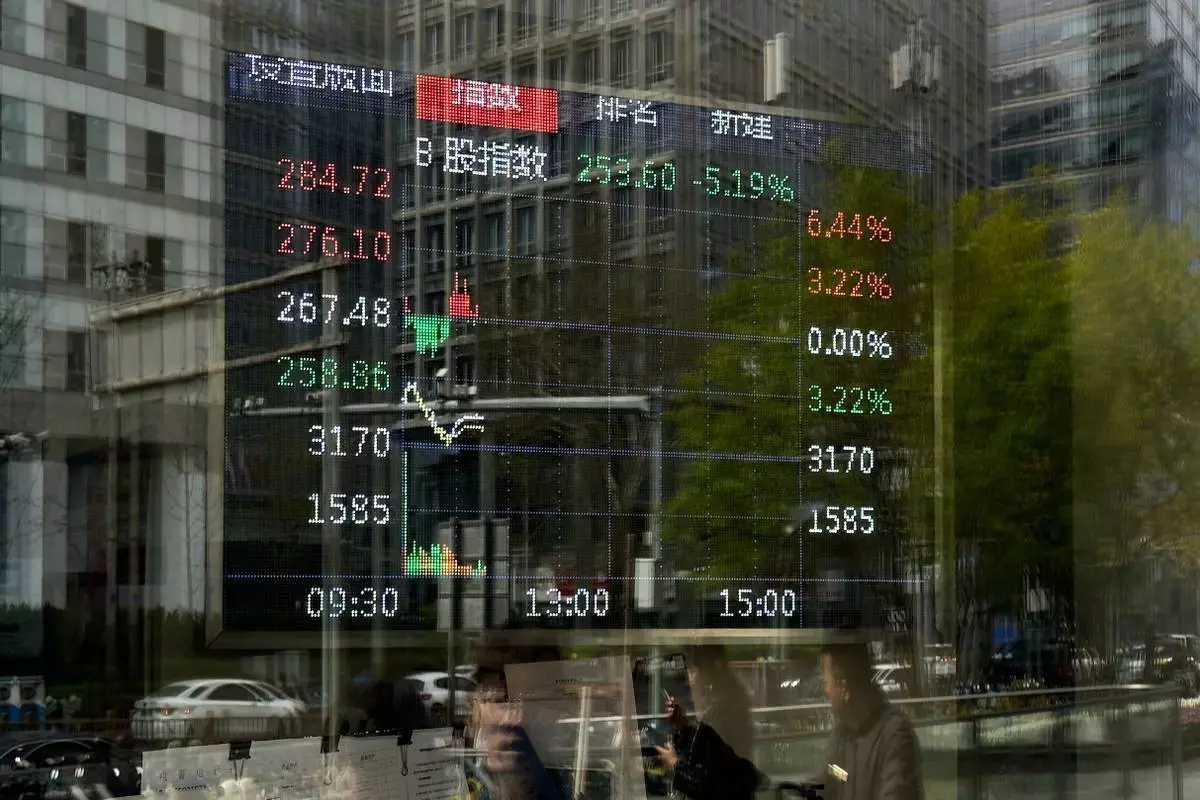
Pedestrian are reflected on a brokerage house's window as an electronic board displays shares trading index, in Beijing, Monday, April 7, 2025. (AP Photo/Andy Wong)
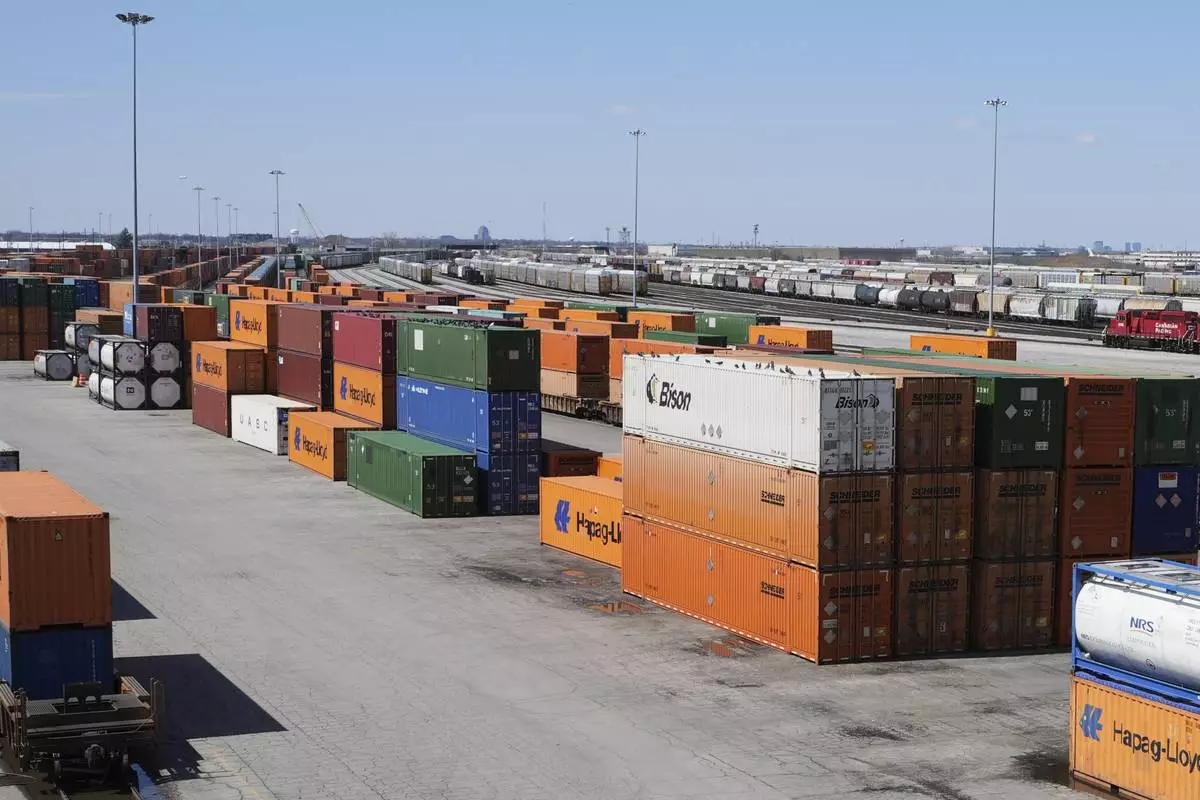
Shipping containers are stored at Bensenville intermodal terminal in Franklin Park, Ill., Sunday, April 6, 2025. (AP Photo/Nam Y. Huh)
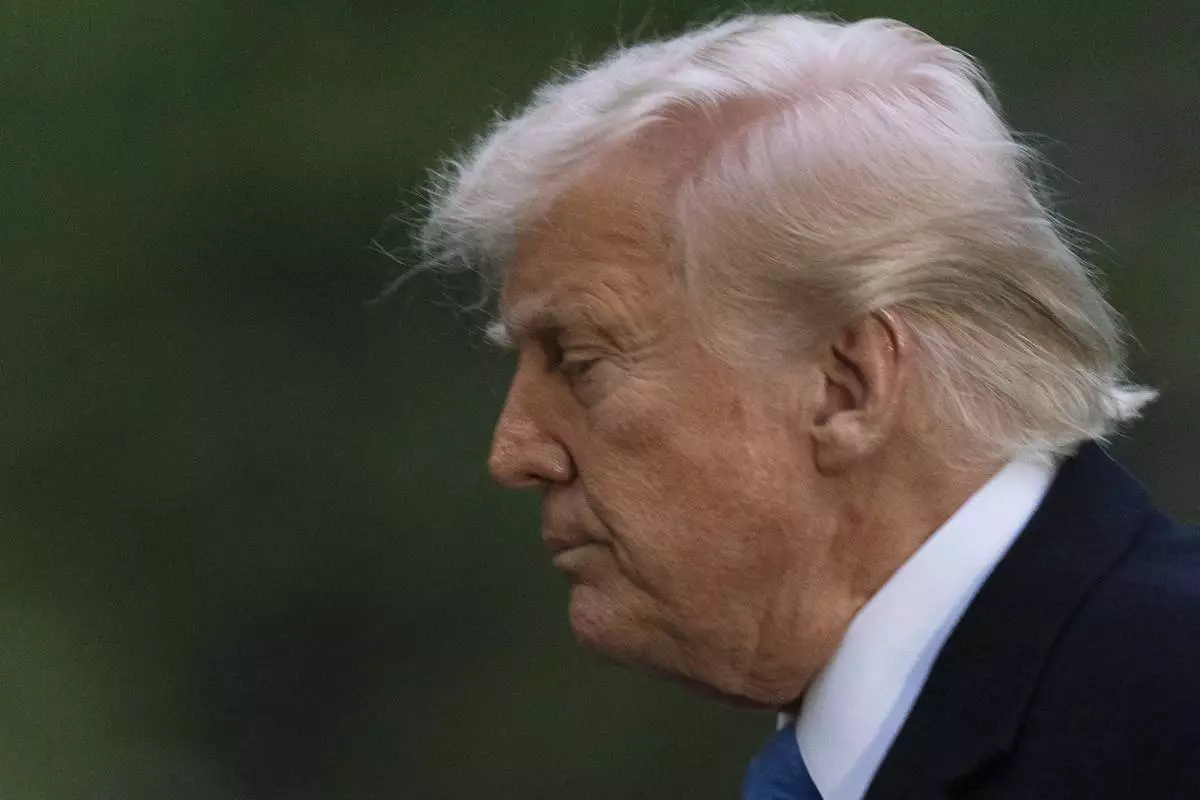
President Donald Trump arrives at the White House on Marine One, Sunday, April 6, 2025, in Washington. (AP Photo/Manuel Balce Ceneta)









